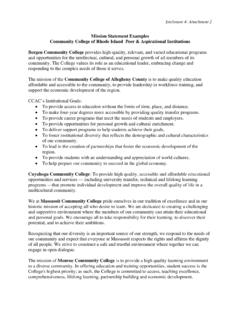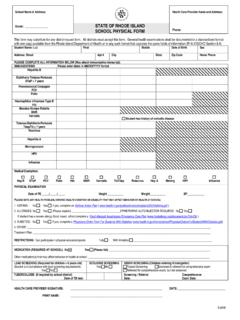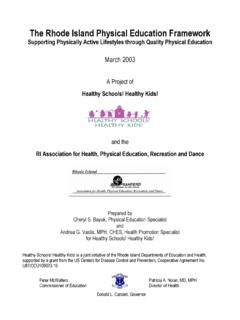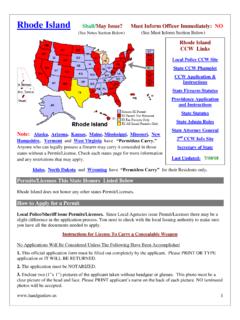Transcription of S-5.0 RESIDENCY POLICY Board of Governors for …
1 RESIDENCY POLICY Board of Governors for higher education State of rhode Island and Providence Plantations Adopted: 12/02/71 (BR) 07/02/81 (BG) Amended: 05/22/80 (BR) 04/15/2993 (BG) 09/27/1995 (BG) 01/15/1998 (BG) 06/30/2003 (BG) 09/26/2011 (BG)* *Please note that the Board s RESIDENCY POLICY as amended on 09/26/2011 and effective Fall semester 2012 is set forth as a separate document on this website. A. CHARGES FOR TUITION AND FEES 1. A student who is a resident of the State of rhode Island shall be classified as a "resident student" and shall pay tuition and fees prescribed by the Board of Governors for in-state students in public higher education .
2 A student who is not a resident of the State of rhode Island shall be classified as a "non-resident student" and shall pay tuition and fees prescribed by the Board of Governors for out-of-state students in public higher education . 2. An international student who meets the following requirements to establish rhode Island RESIDENCY shall pay tuition and fees prescribed by the Board of Governors for in-state students: Individuals and their children who have been granted Temporary Protected Status by the INS and who present evidence of being domiciled in rhode island for at least one year (until their status has been finally determined by the INS).
3 Individuals and their children who have been granted refugee settlement status or political asylum by the INS and who give evidence of being domiciled in rhode Island for one year. 3. Nothing in these regulations shall be construed to revoke, amend or otherwise affect any agreement relating to student tuition and fees now in effect or entered into in the future pursuant to the provisions of the New England Board of higher education Compact. B. DEFINITIONS 1. For the purpose of determining in-state and out-of-state classifications, the word RESIDENCY shall mean domicile: the legal, documented, true and home and place of habitation.
4 For the unemancipated student, the domicile will be that of the parents and/or guardians. For the emancipated student, the domicile will be that of the student. A non-resident student who reaches 18 years of age while a student does not by virtue of that fact alone become a resident student. The ownership of real or personal property in the state and/or the payment of municipal and/or state taxes in rhode Island and/or marriage to a rhode Island resident shall be evidence of, but shall not alone establish, RESIDENCY . 2. The term emancipated student shall mean a student who has attained the age of 18 years and whose parents and/or guardians: (a) have entirely surrendered the right to the care, custody and earnings of such student; and (b) have not claimed the student as a dependent for tax purposes for two years; and (c) do not provide regular financial assistance to the student; and (d) whose income was not taken into account by any private or governmental agency furnishing financial education assistance to the student, including scholarships, loans, or otherwise.
5 If any of the aforesaid tests are not met, the student shall be presumed to be unemancipated. C. CRITERIA 1. Unemancipated Students a. Any unemancipated student whose parents and/or guardians have been residents of the state for one year immediately preceding the first class day of the first semester of the student's registration in a public college or university shall be classified as a resident student as long as the parents and/or guardians continue to be residents of the state. b. Any unemancipated student who initially was classified as a non-resident student may thereafter obtain re-classification only if the student's parents and/or guardians establish and maintain residence in rhode Island for a period of at least one year prior to the first class day of the semester for which the student seeks to be re-classified as a resident student.
6 C. The RESIDENCY of an unemancipated student, including those whose parents and/or guardians are divorced or legally separated, shall follow that of the parent or guardian who has legal custody or the or guardian who is responsible for the financial support of the student, whichever favors the student's request for resident student status. d. An unemancipated student under guardianship shall be required to present satisfactory documentary evidence of the appointment of the guardian in addition to a certification of the RESIDENCY of the guardian, which shall be considered the RESIDENCY of the student unless there are circumstances indicating that such guardianship was created primarily for the purpose of conferring resident student status on the student.
7 E. An unemancipated student whose parent or guardian is a member of the Armed Forces and stationed in the state pursuant to military orders shall be entitled to the classification as a resident student during any semester the first class day of which is encompassed by the orders. 2. Emancipated Students a. Any emancipated student may be classified as a resident student if the student meets the following tests: 1) At the time of emancipation, the student's parents and/or guardians were residents of rhode Island for one year immediately preceding the first class day of the first semester of the student's registration at a public college or university.
8 Or Having become emancipated, the student establishes and maintains RESIDENCY in rhode Island for one year immediately preceding the first day of the first semester of the student's registration at a public college or university; and 2) The student does not hold RESIDENCY in another state or foreign country; and 3) The student is and continues to be a resident of rhode Island. b. Any emancipated student who initially was classified as a non-resident student may thereafter obtain re-classification as a resident student only if the student establishes and maintains RESIDENCY in rhode Island for a period of at least one year prior to the first class day of the semester for which re-classification as a resident student is being sought.
9 C. A student from another state or foreign country who is enrolled at a public college or university for more than six credits per semester shall be presumed to be in rhode Island primarily for educational purposes and will be presumed to have not been a resident of the state during the time so enrolled. Continued presence in rhode Island during periods or occasional interruptions in the course of study will not, of itself, overcome these presumptions. d. Pursuant to the reauthorization of the federal higher education Act on August 14, 2008, a member of any branch of the Armed Forces (as defined in section 101 of title 10 of the United States Code) who has been on active duty for a period of more than 30 days shall, upon establishing domicile in the state of rhode Island, or whose permanent duty station is in the state of rhode Island, be entitled to classification as a rhode Island resident for the purpose of determining tuition and fees.
10 A member of any branch of the Armed Forces who is injured while on active duty and whose injury causes him/her to be on active duty for a period of less than 30 days shall, upon establishing domicile in the state of rhode Island, or whose permanent duty station is in the state of rhode Island, be entitled to classification as a rhode Island resident for the purpose of determining tuition and fees. This determination of tuition and fees shall apply to both undergraduate and graduate students. Any member of the Armed Forces seeking to qualify for in-state tuition rates must provide official documentation that indicates their permanent duty station is in the state of rhode Island and/or documentation evidencing their domicile within the state.











